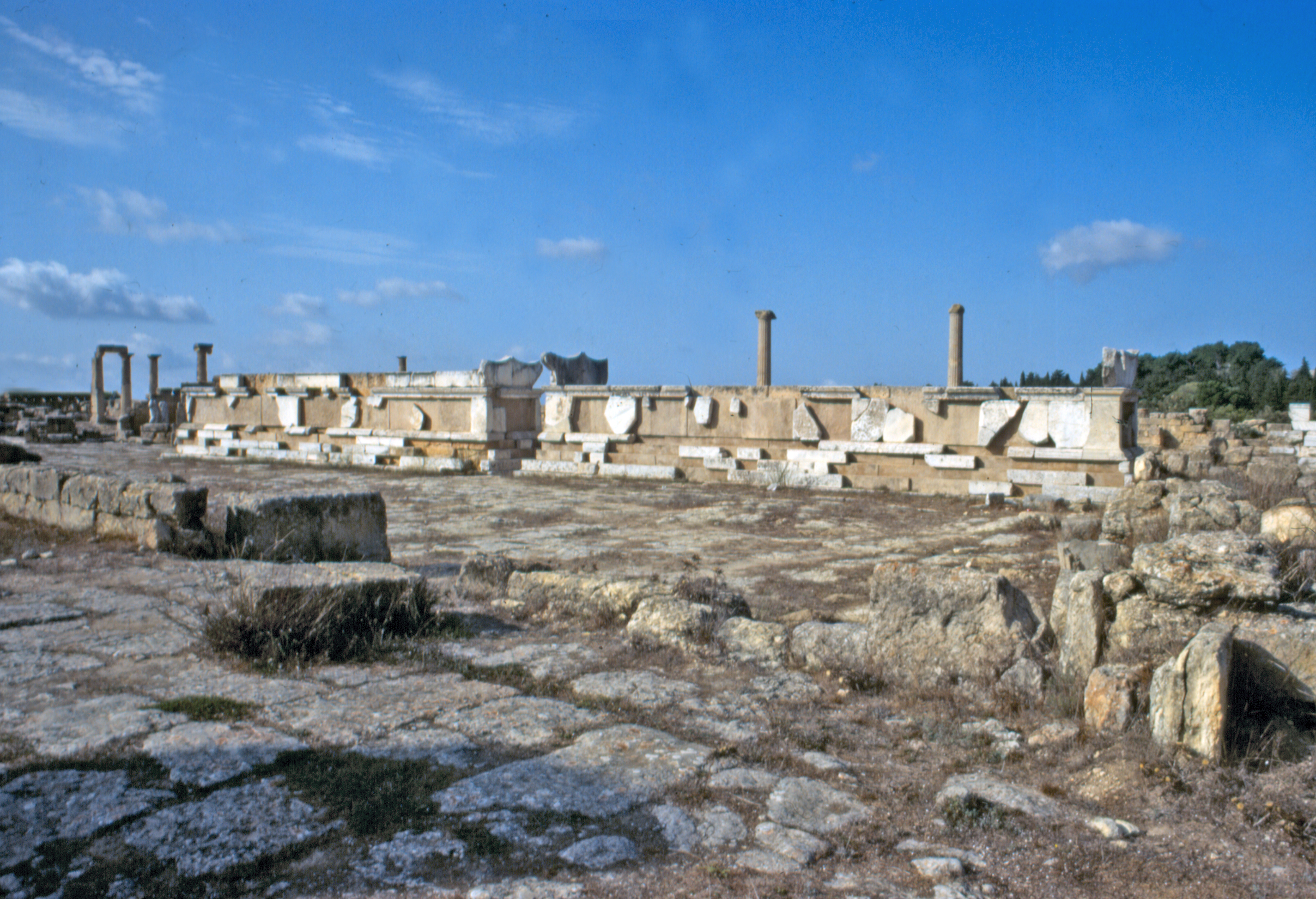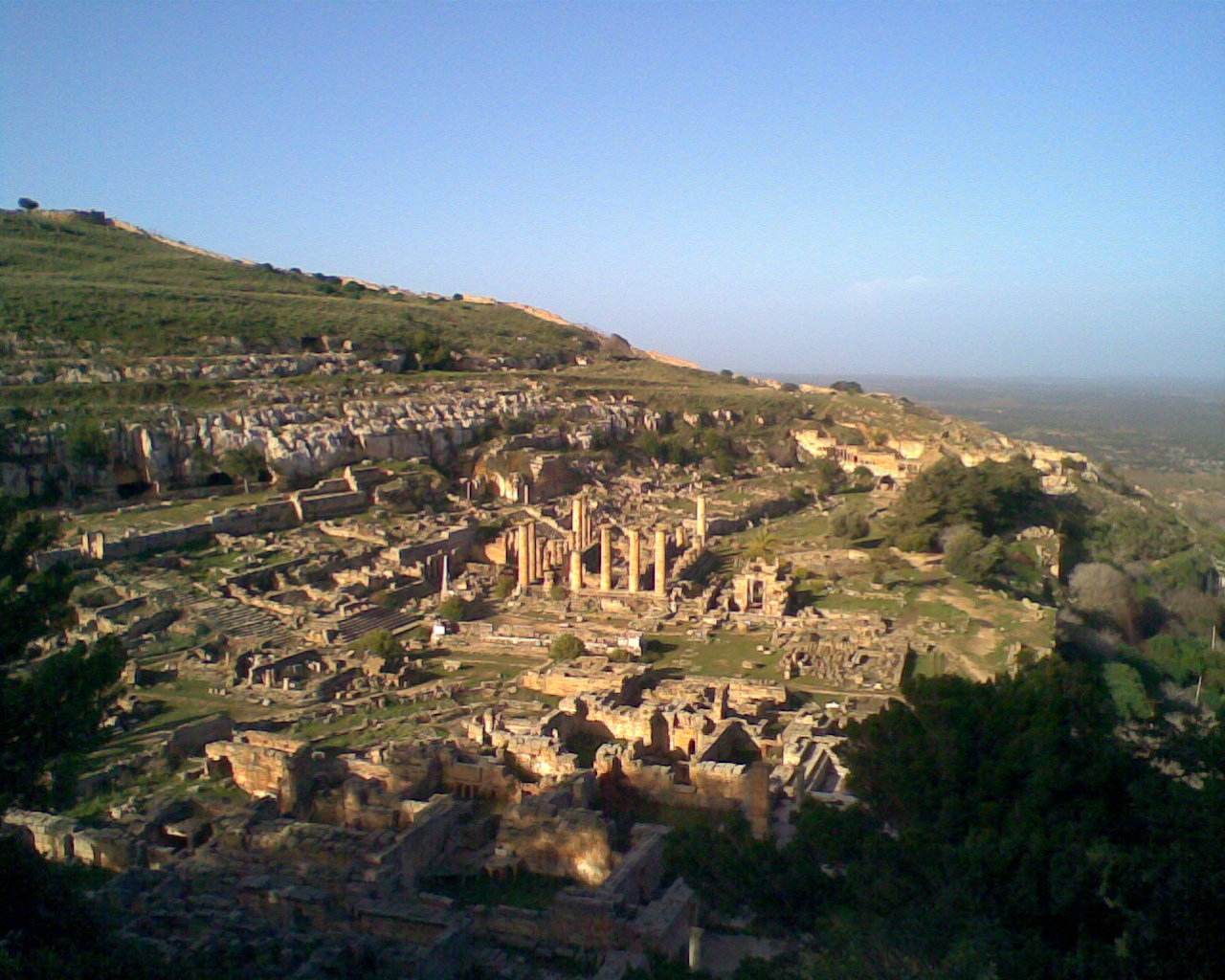|
Cyrenaic
The Cyrenaics or Kyrenaics ( grc, Κυρηναϊκοί, Kyrēnaïkoí), were a sensual hedonist Greek school of philosophy founded in the 4th century BCE, supposedly by Aristippus of Cyrene, although many of the principles of the school are believed to have been formalized by his grandson of the same name, Aristippus the Younger. The school was so called after Cyrene, the birthplace of Aristippus. It was one of the earliest Socratic schools. The Cyrenaics taught that the only intrinsic good is pleasure, which meant not just the absence of pain (as it did for Epicurus), but positively enjoyable sensations. Of these, momentary pleasures, especially physical ones, are stronger than those of anticipation or memory. They did, however, recognize the value of social obligation and that pleasure could be gained from altruistic behaviour. The school died out within a century and was replaced by the philosophy of Epicureanism. History of the school The history of the Cyrenaic scho ... [...More Info...] [...Related Items...] OR: [Wikipedia] [Google] [Baidu] |
Cyrene, Libya
Cyrene ( ) or Kyrene ( ; grc, Κυρήνη, Kyrḗnē, arb, شحات, Shaḥāt), was an ancient Greek and later Roman city near present-day Shahhat, Libya. It was the oldest and most important of the five Greek cities, known as the pentapoleis, in the region. It gave eastern Libya the classical name ''Cyrenaica'' that it has retained to modern times. Located nearby is the ancient Necropolis of Cyrene. The traditional founder of the city was Battus the Lacedemonian, though the exact relationship between the fledgling city and other cities has led historians to question that narrative. Particularly, the idea that Thera was the sole "mother city" is disputed; and the relationship with other cities, such as Sparta and Samnium merchants, is unclear. Cyrene lies in a lush valley in the Jebel Akhdar uplands. The city was named after a spring, Kyre, which the Greeks consecrated to Apollo. It became the seat of the Cyrenaics, a famous school of philosophy in the fourth century ... [...More Info...] [...Related Items...] OR: [Wikipedia] [Google] [Baidu] |
Aristippus
Aristippus of Cyrene (; grc, Ἀρίστιππος ὁ Κυρηναῖος; c. 435 – c. 356 BCE) was a hedonistic Greek philosopher and the founder of the Cyrenaic school of philosophy. He was a pupil of Socrates, but adopted a very different philosophical outlook, teaching that the goal of life was to seek pleasure by adapting circumstances to oneself and by maintaining proper control over both adversity and prosperity. His view that pleasure is the only good came to be called ethical hedonism. Despite having two sons, Aristippus identified his daughter Arete as the "intellectual heiress" of his work. There are indications that Aristippus was conflated with his grandson, Aristippus the Younger. Life Aristippus, the son of Aritades, was born in Cyrene, Ancient Libya, c. 435 BCE. He came to Greece to be present at the Olympic games, where he asked Ischomachus about Socrates, and by his description was filled with so ardent a desire to see Socrates, that he went to At ... [...More Info...] [...Related Items...] OR: [Wikipedia] [Google] [Baidu] |
Hedonists
Hedonism refers to a family of theories, all of which have in common that pleasure plays a central role in them. ''Psychological'' or ''motivational hedonism'' claims that human behavior is determined by desires to increase pleasure and to decrease pain. ''Normative'' or ''ethical hedonism'', on the other hand, is not about how we actually act but how we ought to act: we should pursue pleasure and avoid pain. ''Axiological hedonism'', which is sometimes treated as a part of ethical hedonism, is the thesis that only pleasure has intrinsic value. Applied to well-being or what is good for someone, it is the thesis that pleasure and suffering are the only components of well-being. These technical definitions of hedonism within philosophy, which are usually seen as respectable schools of thought, have to be distinguished from how the term is used in everyday language, sometimes referred to as "folk hedonism". In this sense, it has a negative connotation, linked to the egoistic pursuit ... [...More Info...] [...Related Items...] OR: [Wikipedia] [Google] [Baidu] |
Hegesias Of Cyrene
Hegesias ( el, Ἡγησίας; fl. 290 BC) of Cyrene was a Cyrenaic philosopher. He argued that eudaimonia (happiness) is impossible to achieve, and that the goal of life should be the avoidance of pain and sorrow. Conventional values such as wealth, poverty, freedom, and slavery are all indifferent and produce no more pleasure than pain. Cicero claims that Hegesias wrote a book called ἀποκαρτερῶν (''Death by Starvation''), which persuaded so many people that death is more desirable than life that Hegesias was banned from teaching in Alexandria. It has been thought by some that Hegesias was influenced by Buddhist teachings. Life Diogenes Laërtius describes Hegesias as the pupil of Paraebates, who was a pupil of Epitimedes, who was a pupil of Antipater of Cyrene, who was a pupil of Aristippus (c. 435 – c. 360 BC). He was the fellow-student of Anniceris, but he differed from Anniceris by presenting the system which Anniceris softened and improved in its most n ... [...More Info...] [...Related Items...] OR: [Wikipedia] [Google] [Baidu] |
Arete Of Cyrene
Arete of Cyrene (; el, Ἀρήτη; fl. 5th–4th century BC) was a Cyrenaic philosopher who lived in Cyrene, Libya. She was the daughter of Aristippus of Cyrene. Life and teachings Arete learned philosophy from her father, Aristippus, who had himself learned philosophy from Socrates. Arete, in turn, taught philosophy to her son - Aristippus the Younger - hence her son was nicknamed "Mother-taught" ( el, μητροδίδακτος). Arete reportedly took over the leadership of the School of Cyrene upon her father's death. She is mentioned by Diogenes Laërtius, Strabo, Aelius, Clement of Alexandria, Theodoret of Cyrus, Aristocles and in the ''Suda''. Diogenes records that among her pupils were Theodorus the Atheist and Anniceris. While no credible historic source has survived on Arete's teachings, the tenets of the School of Cyrene which her father founded are known. It was one of the first to advance a systematic view on the role of pleasure and pain in human life. The C ... [...More Info...] [...Related Items...] OR: [Wikipedia] [Google] [Baidu] |
Anniceris
Anniceris ( grc-gre, Ἀννίκερις; fl. 300 BC) was a Cyrenaic philosopher. He argued that pleasure is achieved through individual acts of gratification which are sought for the pleasure that they produce, but he also laid great emphasis on the love of family, country, friendship and gratitude, which provide pleasure even when they demand sacrifice. Life Anniceris was a disciple of Parabates, and a fellow student of Hegesias. The Suda says he lived at the time of Alexander the Great (ruled 336–323 BC). Diogenes Laertius tells a story that Anniceris ransomed Plato from Dionysius, tyrant of Syracuse, for twenty minas. This may possibly refer to an earlier Anniceris, possibly the celebrated charioteer mentioned by Aelian. Philosophy Anniceris denied that pleasure was merely the absence of pain, for if so death would be a pleasure; and furthermore he denied that pleasure is the ''general'' goal of human life. To each separate action, there is a ''particular'' end, namely th ... [...More Info...] [...Related Items...] OR: [Wikipedia] [Google] [Baidu] |
Theodorus The Atheist
Theodorus the Atheist ( el, Θεόδωρος ὁ ἄθεος; c. 340 – c. 250 BCE), of Cyrene, was a Greek philosopher of the Cyrenaic school. He lived in both Greece and Alexandria, before ending his days in his native city of Cyrene. As a Cyrenaic philosopher, he taught that the goal of life was to obtain joy and avoid grief, and that the former resulted from knowledge, and the latter from ignorance. However, his principal claim to fame was his alleged atheism. He was usually designated by ancient writers ''ho atheos'' (), "the atheist." Life Theodorus was a disciple of Aristippus the Younger, grandson of the elder and more famous Aristippus. He heard the lectures of a number of philosophers beside Aristippus; such as Anniceris, and Dionysius the dialectician, Zeno of Citium, and Pyrrho. He was banished from Cyrene, but for what reason is not stated; and it is from the saying recorded of him on this occasion, "Men of Cyrene, you do ill in banishing me from Libya to Greece ... [...More Info...] [...Related Items...] OR: [Wikipedia] [Google] [Baidu] |
Epicureanism
Epicureanism is a system of philosophy founded around 307 BC based upon the teachings of the ancient Greek philosopher Epicurus. Epicureanism was originally a challenge to Platonism. Later its main opponent became Stoicism. Few writings by Epicurus have survived. However, there are independent attestations of his ideas from his later disciples. Some scholars consider the epic poem ''De rerum natura'' (Latin for ''On the Nature of Things'') by Lucretius to present in one unified work the core arguments and theories of Epicureanism. Many of the scrolls unearthed at the Villa of the Papyri at Herculaneum are Epicurean texts. At least some are thought to have belonged to the Epicurean philosopher Philodemus. Epicurus also had a wealthy 2nd-century AD disciple, Diogenes of Oenoanda, who had a portico wall inscribed with tenets of the philosophy erected in Oenoanda, Lycia (present day Turkey). Epicurus was an atomic materialist, following in the steps of Democritus. His mate ... [...More Info...] [...Related Items...] OR: [Wikipedia] [Google] [Baidu] |
Socrates
Socrates (; ; –399 BC) was a Greek philosopher from Athens who is credited as the founder of Western philosophy and among the first moral philosophers of the ethical tradition of thought. An enigmatic figure, Socrates authored no texts and is known mainly through the posthumous accounts of classical writers, particularly his students Plato and Xenophon. These accounts are written as dialogues, in which Socrates and his interlocutors examine a subject in the style of question and answer; they gave rise to the Socratic dialogue literary genre. Contradictory accounts of Socrates make a reconstruction of his philosophy nearly impossible, a situation known as the Socratic problem. Socrates was a polarizing figure in Athenian society. In 399 BC, he was accused of impiety and corrupting the youth. After a trial that lasted a day, he was sentenced to death. He spent his last day in prison, refusing offers to help him escape. Plato's dialogues are among the most ... [...More Info...] [...Related Items...] OR: [Wikipedia] [Google] [Baidu] |






.jpg)